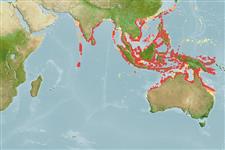Common names from other countries
>
Eupercaria/misc (Various families in series Eupercaria) >
Lethrinidae (Emperors or scavengers) > Lethrininae
Etymology: Lethrinus: Greek, lethrinia, a fish pertaining to genus Pagellus.
More on author: Valenciennes.
Environment: milieu / climate zone / depth range / distribution range
Ekologi
laut berasosiasi dengan karang; nir-ruaya; kisaran kedalaman 5 - 30 m (Ref. 37816). Tropical; 30°N - 27°S, 70°E - 154°E
Indo-West Pacific: Maldives (Ref. 30829) and Sri Lanka to the Ryukyu Islands, Papua New Guinea, and northeast Australia. Reported from Viet Nam but this is probably a misidentification (Ref. 2682).
Size / Weight / umur
Maturity: Lm ? range ? - 20 cm
Max length : 45.0 cm TL jantan/; (Ref. 48635)
Duri punggung (Keseluruhan (total)): 10; duri punggung lunak (Keseluruhan (total)): 9; Duri dubur 3; Sirip dubur lunak: 8. This species is distinguished by the following characters: body relatively deep, its depth 2.3-2.6 times in standard length. Head length 0.8-0.9 times in body depth, 2.7-3 times in SL, dorsal profile near eye convex; snout length about 2-2.5 times in HL, measured without the lip the snout is 0.9-1.1 times in cheek height, its dorsal profile nearly straight or slightly concave, snout angle relative to upper jaw between 65° and 75°; interorbital space convex; posterior nostril a longitudinal oblong opening, closer to orbit than anterior nostril; eye situated close to dorsal profile, its length 3.3-4.1 times in HL; cheek height 2.2-2.8 times in HL; lateral teeth in jaws rounded with points or molars; outer surface of maxilla usually smooth, sometimes with a longitudinal ridge. D X,9 with the 4th or 5th dorsal-fin spine the longest, its length 2.7-3.3 times in body depth; A III,8 with the first soft ray usually the longest, its length longer than length of base of soft-rayed portion of anal fin and 1.1-1.5 times in length of entire anal-fin base; pectoral-fin rays 13; pelvic-fin membranes between rays closest to body without dense melanophores; cheek without scales; 46-47 lateral-line scales; 5 ½ scale rows between lateral line and base of middle dorsal-fin spines; 15-16 scale rows in transverse series between origin of anal fin and lateral line; 13-15 rows in lower series of scales around caudal peduncle; usually 3-8 scales in supratemporal patch; inner surface of pectoral-fin base densely covered with scales; posterior angle of operculum fully scaly. Colour of body dusky whitish, lighter below, with 5-6 orange stripes; posterior edge of opercle and preopercle bright red (the former more conspicuous); head brown or tan, sometimes a red spot on lower front edge of eye; pectoral fins orangish; pelvic and anal fins, and most of dorsal fin whitish; edge of dorsal and caudal fins reddish (Ref. 114226).
Inhabits sandy and soft bottoms and seagrass beds in inshore bays, lagoons and areas adjacent to reefs. Usually in small groups (Ref. 48635). Feeds on crustaceans, mollusks, echinoderms, polychaetes and small fishes. Juveniles commonly visit the tidal reef flats to feed when the water is high (Ref. 48635). Caught by trap, handline, shore seine, trawl, and handline. Minor importance in fisheries where it occurs (Ref. 68703).
Carpenter, K.E. and G.R. Allen, 1989. FAO Species Catalogue. Vol. 9. Emperor fishes and large-eye breams of the world (family Lethrinidae). An annotated and illustrated catalogue of lethrinid species known to date. FAO Fish. Synop. 125(9):118 p. Rome: FAO. (Ref. 2295)
Status IUCN Red List (Ref. 130435)
CITES (Ref. 128078)
Not Evaluated
ancaman kepada manusia
Harmless
penggunaan manusia
Perikanan: nilai komersial kecil
informasi lanjut
AcuanBudidaya airprofil budidaya airStrainGenetikaElectrophoresesDiturunkanPenyakit-penyakitPengolahanMass conversion
mitraGambarStamps, Coins Misc.Suara-suaraCiguateraKecepatanTipe renangArea insangOtolithsOtakPenglihatan / visi
Alat, peralatan
laporan khas
muat turun XML
Sumber internet
Estimates based on models
Preferred temperature (Ref.
115969): 26.5 - 29.3, mean 28.7 (based on 2098 cells).
Phylogenetic diversity index (Ref.
82804): PD
50 = 0.5000 [Uniqueness, from 0.5 = low to 2.0 = high].
Bayesian length-weight: a=0.01905 (0.01094 - 0.03320), b=3.02 (2.87 - 3.17), in cm Total Length, based on LWR estimates for this species & Genus-body shape (Ref.
93245).
Trophic level (Ref.
69278): 3.4 ±0.43 se; based on food items.
Daya lenting (Ref.
120179): Tinggi, Waktu penggandaan populasi minimum kurang dari 15 bulan (K=0.4-0.5).
Fishing Vulnerability (Ref.
59153): Low to moderate vulnerability (27 of 100).
